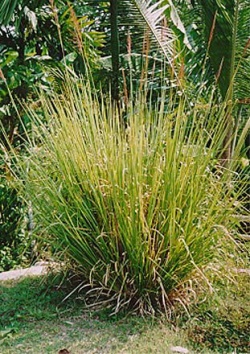Vetiver
From Wikiwel
Other Names: Anatherum zizanioides, Andropogon odoratus, Chiendent Odorant, Chrysopogon zizanioides, Cuscus, Cuscus Grass, Cuseus Grass, Khas, Khas-khas, Khus Khus, Khus-khus Grass, Phalaris zizanioides, Reshira, Sugandhimula, Usheer, Ushira, Vétiver, Vetiveria zizanioides, Vetivergras, Zacate Violeta, Ramacham
Chrysopogon zizanioides is a perennial grass of the Poaceae family, native to India.
Special Precautions of Vetiver
- Vetiver is safe in food amounts and possibly safe for most people when taken by mouth as a medicine. But the possible side effects are not known.
- Pregnancy and breast-feeding: It is UNSAFE to take vetiver if you are pregnant. It might cause a miscarriage. It’s also best to avoid vetiver if you are breast-feeding. The effects on a nursing infant are unknown.
The benefits of Vetiver are
- BY MOUTH
- Causing an abortion.
- Nerve problems.
- Circulation problems.
- Other conditions.
- APPLIED TO THE SKIN
- Lice.
- Repelling insects.
- Stress.
- Acne
- Cuts
- Sores
- Oily skin
- Wounds
- INHALATION
- Joint and muscle pain (rheumatism, Arthritis, muscular aches and pains, sprains, stiffness).
- Trouble sleeping (insomnia).
- depression
- exhaustion
- insomnia
